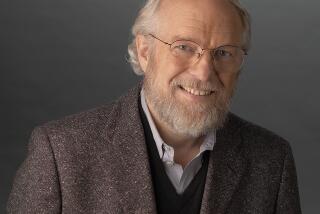The Cutting Edge: Computing / Technology / Innovation : INTELLECTUAL PROPERTIES : Patent Policies on Trial : Law: Screen-saving bunny case raises concerns about using the media to pressure a U.S. agency.
- Share via
Instead of waiting for his day in court, PC Dynamics President Peter Avritch decided to go straight to the top in defending his company against what appeared to be an unreasonable patent-infringement lawsuit.
Avritch sent two-foot-tall stuffed pink rabbits and pleas for help to U.S. Sens. Dennis DeConcini (D-Ariz.) and Dianne Feinstein (D-Calif.). He spent days on the telephone enlisting support from colleagues and rivals. Perhaps most important, he told his tale of woe to the media.
The campaign had one goal: to force the Patent and Trademark Office into an uncommon re-examination of a patent award. Its eventual success has unnerved many in the intellectual property community, who abhor the idea of complex copyright and trademark disputes being judged in the court of public opinion.
The patent, held by Software Advertising Corp. of La Costa, Calif., is for a process that inserts advertising into computer software. PC Dynamics, a small Westlake Village software company, markets a screen saver--a program that prevents images from being burned into a computer screen--featuring the Eveready Energizer Bunny.
The trouble was, the popular drum-beating rabbit advertised Eveready batteries. From Software Advertising’s perspective, any advertising that appeared on a computer was infringing its patent, so it demanded a royalty from PC Dynamics.
Avritch denounced the patent as absurd and a danger to the software industry, comparing it to someone owning the rights to printing business logos on coffee cups. But even justified indignation isn’t a shield from damage awards and bankruptcy. Avritch saw that if he chose to engage in a court struggle, the cost could kill PC Dynamics even if it emerged victorious.
Instead, Avritch decided to test what he had learned from a case involving Carlsbad, Calif.-based Compton’s New Media.
The patent office last August granted Compton’s a broad patent on multimedia search and retrieval processes, meaning that just about anyone in the burgeoning multimedia field--from movie studios to computer companies--would owe royalties to Compton’s.
The resulting storm of protest caused the patent office, under the direction of a new, politically savvy commissioner, Bruce Lehman, to rescind the patent in March--an extremely rare move. (Compton’s has since reapplied for the patent.)
In the Compton’s case, the reversal was provoked by a spontaneous show of anger. But Avritch saw that an orchestrated publicity effort could achieve the same end. Sure enough, Lehman announced in May that the patent office would re-examine the Software Advertising Corp. patent.
That decision has alarmed some patent attorneys, who say the patent office may begin paying more attention to the roar of media ridicule than to the rule of law.
“The patent office is supposed to protect the public and not adopt the interests of one particular group,” said Ronald Yin, a patent specialist in the San Francisco law firm Limbach & Limbach. “The commissioner should not be forced by outside sources to perform certain acts. But the precedent has been set, and other companies likely will look to use the same tactics.”
Not all lawyers are worried. David Hayes, who heads the intellectual property practice at Fenwick & West in Palo Alto, believes that manipulation of the patent office through the media will be a short-lived phenomenon.
It has succeeded in a few cases, he says, only because it serves Lehman’s agenda of reforming the patent system.
He agrees that other companies will probably engage in patent lobbying, but he doubts Lehman will be susceptible to them for long.






